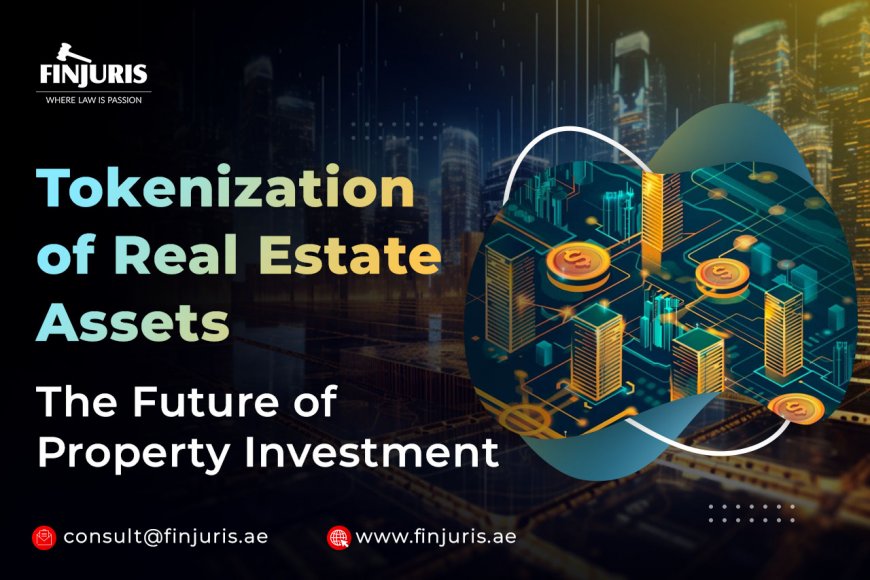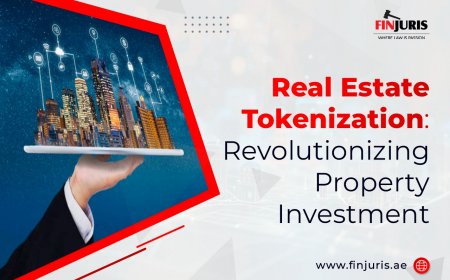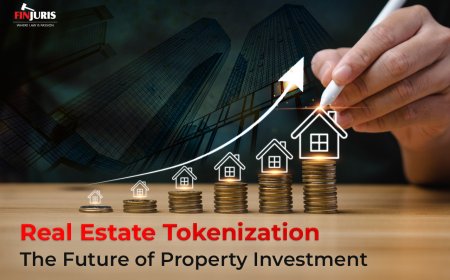Tokenization of Real Estate Assets – The Future of Property Investment
Learn how tokenization of real estate assets is transforming property investment through greater liquidity, access, and efficiency in 2025.

In an age where digital transformation is redefining industries, the world of real estate is undergoing a fundamental shift. One of the most exciting innovations in this space is the tokenization of real estate assets—a process that enables properties to be digitized, fractionalized, and traded on blockchain platforms. Tokenization promises to revolutionize how people invest in and interact with real estate by enhancing liquidity, accessibility, and efficiency.
This article explores the concept, benefits, legal considerations, and future implications of real estate tokenization, making sense of this complex but transformative technology.
What Is Tokenization of Real Estate?
Tokenization refers to the process of converting ownership rights in a real-world asset—such as a residential building, office tower, or land parcel—into a digital token on a blockchain. These tokens represent fractional ownership and can be bought, sold, or transferred with ease.
For example, a $10 million commercial property can be divided into 1,000,000 tokens, each worth $10. An investor could then buy as little as one token, gaining a proportional share in the asset’s value and income.
These digital tokens are typically classified as security tokens because they confer ownership rights, dividends, or profit-sharing mechanisms, and are therefore subject to securities regulations in most jurisdictions.
How Tokenization Works
The tokenization process involves several key steps:
- Asset Selection and Structuring: A suitable property is identified and legally structured for fractional ownership—often through a Special Purpose Vehicle (SPV).
- Valuation and Legal Setup: A professional valuation is conducted, and legal documentation is prepared to define investor rights, governance, and compliance with securities laws.
- Token Creation: The asset’s ownership is divided into digital tokens using blockchain technology, each representing a specific share or claim.
- Platform Listing and Distribution: Tokens are listed on a compliant digital asset exchange or platform for primary sale and secondary trading.
- Ongoing Management: Investors receive updates, dividends, or rental income distributions through smart contracts or platform interfaces.
The entire lifecycle—from onboarding and KYC to dividend distribution and exit—is managed through technology, making the process efficient and scalable.
Benefits of Real Estate Tokenization
1. Increased Liquidity
Real estate is traditionally an illiquid asset class. Tokenization allows fractional ownership and enables trading on secondary markets, making it easier for investors to enter and exit positions. This liquidity unlocks a broader investor base and improves capital mobility.
2. Fractional Ownership
By dividing a high-value property into affordable token units, tokenization democratizes real estate investment. Retail investors, who previously could not afford to buy physical property, can now gain exposure to real estate with as little as $100 or even less.
Read More: Real Estate Tokenization: Revolutionizing Property Investment
3. Global Accessibility
Blockchain platforms operate globally, enabling cross-border investment without the friction of traditional banking or real estate transfer systems. This opens new avenues for international investors to diversify portfolios.
4. Reduced Costs
Tokenization reduces costs associated with intermediaries, brokers, and paperwork. Smart contracts automate rent distribution, compliance checks, and record-keeping, cutting down administrative burdens.
5. Transparency and Security
Blockchain ensures that ownership records, transaction histories, and rights are immutable and transparent. Smart contracts also reduce the risk of human error and fraud.
Legal and Regulatory Considerations
Tokenized real estate touches on multiple legal domains—real estate law, securities law, tax regulation, and cross-border compliance. Some of the key legal challenges include:
1. Securities Classification
In many jurisdictions, tokens that represent ownership or profit-sharing in real estate are classified as securities. This triggers compliance obligations, including disclosures, prospectus filings, KYC/AML protocols, and investor eligibility criteria.
2. Ownership Rights
Tokens must be clearly linked to legal ownership or beneficial interest in the asset or SPV. Legal enforceability must be ensured in case of disputes, foreclosure, or liquidation.
3. Licensing Requirements
Platforms that issue or trade tokenized real estate may require licenses as securities exchanges, custodians, or crowdfunding intermediaries, depending on the jurisdiction.
4. Data Privacy and AML
Token issuance and transfers must comply with data privacy laws (e.g., GDPR) and AML regulations. This includes collecting and protecting investor information, performing identity verification, and reporting suspicious transactions.
5. Taxation
Token holders may be liable for capital gains tax, income tax on rent distributions, and withholding tax depending on local laws. Transparent reporting and tax structuring is essential.
Use Cases and Market Examples
1. Commercial Real Estate
High-value commercial properties are being fractionalized to allow global investors to participate in stable rental income. These may include office spaces, shopping malls, or hotels.
2. Residential Properties
Luxury apartments and multi-family units are being tokenized to target both income-seeking and capital appreciation-focused investors.
3. Real Estate Investment Trusts (REITs) on Blockchain
Tokenized REITs are gaining traction, enabling more flexible investment and faster settlement compared to traditional REITs.
4. Land and Infrastructure Projects
Tokenization can help finance infrastructure development, especially in emerging markets, by enabling participation from a broader investor base.
Examples:
- RealT (USA): Enables fractional ownership of rental properties in Detroit and Chicago through Ethereum-based tokens.
- Brickblock (Germany): Offers tokenized real estate investment through legal SPV structures.
- ReitBZ (Brazil): A security token backed by distressed real estate assets in São Paulo.
Challenges and Risks
While the promise of tokenized real estate is immense, it also comes with notable challenges:
- Regulatory uncertainty: Many countries are still developing laws to govern tokenized securities.
- Lack of secondary markets: Although liquidity is a key promise, actual trading volumes remain low in most tokenized real estate platforms.
- Valuation volatility: Tokens may not always reflect the true value of the underlying asset due to speculation or low market depth.
- Security and custody risks: Storing digital tokens safely requires secure custody solutions, and investors are vulnerable to hacks if platforms are not well protected.
- Jurisdictional conflicts: Cross-border investment creates complex questions about applicable law, taxation, and dispute resolution.
Future of Tokenized Real Estate
The long-term outlook for real estate tokenization is positive. As regulatory clarity improves and institutional adoption increases, tokenized real estate could become a mainstream investment category. Governments, especially in digital-forward jurisdictions like the UAE, Singapore, and Switzerland, are exploring frameworks to license tokenized asset platforms.
Tokenization also has the potential to integrate with the metaverse and real-world asset bridges, where digital tokens can represent hybrid ownership of both virtual and physical real estate. Furthermore, integration with DeFi lending protocols may allow token holders to use their fractional shares as collateral for loans, unlocking new layers of capital efficiency.
Smart cities may one day use tokenization to raise capital for urban development directly from global citizens, using programmable blockchain systems for transparency and accountability.
The tokenization of real estate assets marks a paradigm shift in how property is owned, managed, and traded. By breaking down barriers to entry, improving liquidity, and leveraging the security of blockchain, tokenization holds the promise of making real estate investment more inclusive, efficient, and transparent. However, the ecosystem must evolve responsibly—backed by legal clarity, investor protections, and technological robustness.
As the real estate and crypto sectors converge, tokenized property may not only represent a new asset class but also a new infrastructure for global capital formation.
What's Your Reaction?




















